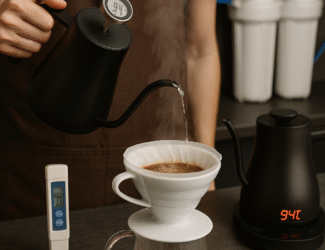
Vitamins and coffee – do they mix?
Would you try ‘wellness’ coffee? Adding vitamins to your morning brew is the new ritual
When it comes to new health buzzwords, wellness coffee is one that we can get on board with.
After all, who wouldn’t want a daily vitamin boost that’s as easy as sipping on your morning brew?
Coffee company Rokit has released a buzzworthy little product, the Mind Boost Pods and Immunity Boost Pods, that they claim to be the UK’s first coffee pods with added vitamins, minerals, and botanicals which aim to boost your overall health.
The Mind Boost pods contain 100% Arabica coffee that has been enriched with vitamins B2, B3, B5, B6 and B12, which the brand claims will support your nervous system and contribute to better mental performance.
While the Immunity Boost pods are also made from 100% Arabica coffee, and enriched with vitamins B6, B12, D and Zinc to support a healthy immune system.
The good news is that the pods are easy to use, compatible with Nespresso machines, 100% recyclable, available in Tesco and they’ll be on sale this month, down to £3 from £4 (sale runs from March 22 to April 11, FYI).
That’s all well and good, but can taking our vitamins along with coffee actually benefit our health, and is it an effective combo? We take a closer look.
Should caffeine and vitamins mix?
There’s no easy answer, but according to registered nutritionist Uta Boellinger, founder of Cannelle Nutrition, it can be a good option for those who aren’t getting the right vitamins from their diet.
She tells us: ‘On the one hand, if someone is unwilling and unable to make any dietary changes and won’t take any supplements in other forms then perhaps having them in their coffee is the best option.’
Be that as it may, BANT registered nutritionist Eva Humphries explains that we need to be wary of the type of nutrients added to our coffee so we can be realistic about the effect.
Humphries explains: ‘It is also worth noting that synthetic nutrients, such as those typically added to coffee, may not be in the right form for us to fully absorb. So, we could end up in a scenario where we think we are getting 100% of our daily recommended intake of a specific vitamin from that enrich-coffee, but we may only actually absorb 10% of that nutrient.’
It’s also worth noting that caffeine isn’t a positive thing for everybody, as Boellinger continues: ‘As a nutritionist I almost always recommend people reduce their caffeine intake and if they come to see me for anything stress-related we usually remove it completely.’
How useful are supplements for our health?
According to Boellinger, supplements are a useful tool for boosting our overall health: ‘In my clinic I always go for a food-first approach but supplements are not only necessary when there is a deficiency, but can help us see results more quickly as they may be more highly concentrated and easier to include than certain foods.’
They go on to advise, however, that instead of looking at it as a ‘one-size fits all’ approach, ‘I would recommend speaking to a nutritionist if you want to take anything other than Vitamin D or a multivitamin to find out what works for you,’ and added: ‘It’s also important to ensure they don’t interfere with any medication you may be on.’
Humphries adds: ‘As a nutritionist, I suggest supplements to my clients for shorter periods of time if there is a very specific need for them. For example, an athlete will likely have nutrient needs so high that it may be a struggle to meet those needs through food alone. In this context, supplements may be useful. On a more general level, it would be more advantageous to get the vitamins we need from food.’



